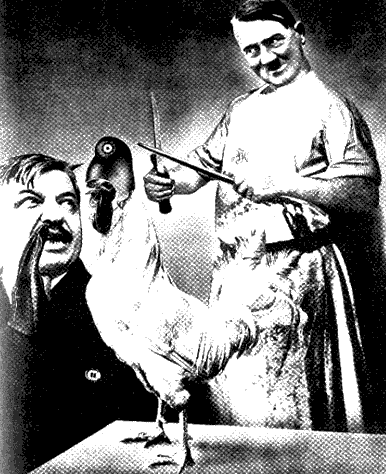
May 11
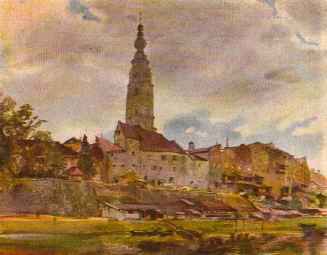
1435 Hannsen Hydler shells out 40 Viennese pounds for some property on the Thaya River, making him the earliest documented 'Hitler' in the Waldviertel region of Austria. [For further details, Click here.]
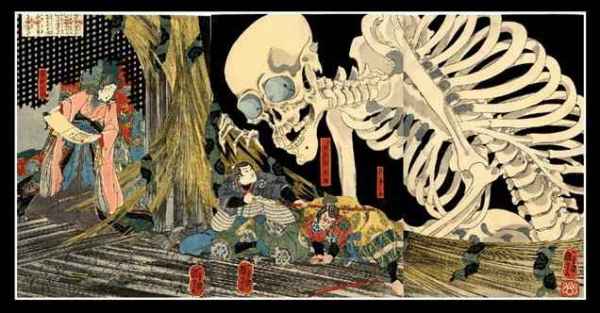
1863 Countdown to Infamy: The "War to expel the barbarians" begins in Japan as the deadline for the expulsion of all Westerners is reached. Rebel ronin (master-less samurai) fire on foreign shipping in the Shimonoseki Strait off Chōshū Province and assassinate Shogunate officials and Westerners, including the English trader Charles Lennox Richardson. (Craig)
[See: Countdown to Infamy: Timeline to Pearl Harbor.]
1888 Birth: Willis A. Lee: World War II US admiral: Under his flag on the battleship Washington (BB-56), he was active through the Guadalcanal Campaign and led his force to victory over a Japanese surface group in the Naval Battle of Guadalcanal on the night of 14–15 November 1942. He was later promoted, and placed in charge of the Pacific Fleet's fast battleships.
Birth: Henry Morgenthau, Jr.: US secretary of the Treasury (1934-45).
1897 Birth: Kurt Gerron: German Jewish actor and film director:
Born Kurt Gerson to Jewish parents in Berlin, Germany, Gerron initially studied medicine but became a stage actor in 1920. He appeared in such films as The Blue Angel opposite Marlene Dietrich, and on stage originated the role of Brown (the chief of police in London) in the premiere production of Die Dreigroschenoper in Berlin in 1928.
Gerron was offered a trip to Hollywood but refused and stayed behind in Europe. He later left Germany, traveling first to France and later to the Netherlands. There, he kept on working as an actor and director in several movies. After the German army occupied the Netherlands, he was interned in the transit camp at Westerbork before being sent to Theresienstadt concentration camp. There he ran a cabaret called The Karussell to entertain the inmates.
In 1944, Gerron was either persuaded or coerced by the Nazis to make a propaganda film showing how humane the conditions were at Theresienstadt. After shooting finished, Gerron was deported on the camp's final transport to Auschwitz. He was murdered immediately upon arrival. Reichsfuehrer SS Heinrich Himmler did not order the gas chambers shut down until the next day. Gerron's film, supposed to have been titled either Theresienstadt. Ein Dokumentarfilm aus dem juedischen Siedlungsgebiet (Terezin: A Documentary Film of the Jewish Resettlement) or, Der Fuehrer schenkt den Juden eine Stadt (The Fuehrer Gives the Jews a City), was supposedly never completed and exists today only in fragmentary form.
1915 World War I: List Regiment: Gefreiter Adolf Hitler's 16 Reserve Infantry Regiment continues to occupy a position at Fromelles (pictured above in a drawing by Hitler), which is on a level field with water channels, willow trees and willow stalks. In the distance towards the enemy lines lies an insignificant wood with barbed wire entanglements. Under the direction of their defense-minded commander, Lieutenant General Gustav Scanzoni von Lichtenfels, the regiment works ceaselessly day and night in the subsequent weeks, to further fortify their position at Fromelles. [For further details, Click here.]
1917 World War I: List Regiment: After an intensive artillery barrage, British troops mount a frontal attack on Gefreiter Adolf Hitler's 16th RIR's position east of Vimy Ridge. [For further details, Click here.] 1918 World War I: Various: British Admiralty Statement on the Raid upon Ostend:
The Sirius lies in the surf some two thousand yards east of the entrance to Ostend Harbor, which she failed so gallantly to block; and when, in the early hours of yesterday morning, the Vindictive groped her way through the smoke-screen and headed for the entrance, it was as though the old fighting-ship awoke and looked on. A coastal motor-boat had visited her and hung a flare in her slack and rusty rigging; and that eye of unsteady fire, paling in the blaze of the star-shells or reddening through the drift of the smoke, watched the whole great enterprise, from the moment when it hung in doubt to its ultimate triumphant success.
List Regiment: Gefreiter Adolf Hitler's 16th RIR is sent back to hold a sector near an earlier position at Laon. [For further details, Click here.] 1919 Versailles: Germans prepare to protest treaty terms:
During the second week of May 1919, the recently arrived German delegation to the Versailles Peace Conference—convened in Paris after the end of the First World War—pore over their copies of the Treaty of Versailles, [which was] drawn up in the months preceding, by representatives of their victorious enemies. [The Germans] prepare to lodge their objections to what they considered to be unfairly harsh treatment.
Presented with the treaty on May 7, 1919, the German delegation was given two weeks to examine the terms, and [to] submit their official comments in writing. The Germans, who had put great faith in U.S. President Woodrow Wilson's notion of a so-called peace without victory, and had pointed to his famous Fourteen Points as the basis upon which they sought peace in November 1918, were greatly angered and disillusioned by the treaty. As Ulrich von Brockdorff-Rantzau, Germany's foreign minister, put it: "This fat volume was quite unnecessary. They could have expressed the whole thing more simply in one clause: 'Germany renounces its existence.'
Driven by French and British desires to make Germany pay for the role it had played in the most devastating conflict the world had yet seen, Wilson and the other Allied representatives at the peace conference had indeed moved away from a pure 'peace without victory.' Germany was to lose 13 percent of its territory and 10 percent of its population. It was denied initial membership in the League of Nations, the international peace-keeping organization established by the treaty. The treaty also required Germany to pay reparations, though the actual amount ended up being less than what France had paid after the Franco-Prussian War of 1870–71.
The real German objection to the Treaty of Versailles, however, was to the infamous Article 231, which forced Germany to accept sole blame for the war in order to justify the reparations. Despite much debate among the Allies themselves and over strenuous German protests—including by Brockdorff-Rantzau—who wrote to the Allies on May 13 that the German people did not will the war and would never have undertaken a war of aggression, Article 231 remained in the treaty. The Germans were given a deadline of June 16 to accept their terms; this was later extended to June 23. Pressured by the Allies and thrown into confusion by crisis within the Weimar government at home, the Germans gave in and accepted the terms at 5:40 p.m. on May 23.
The Versailles Treaty was signed on June 28, 1919. Meanwhile, opposition to the treaty and its Article 231, seen as a symbol of the injustice and harshness of the whole document, festered within Germany. As the years passed, full-blown hatred slowly settled into a smoldering resentment of the treaty and its authors, a resentment that would, two decades later, be counted—to an arguable extent—among the causes of the Second World War.
1926 Austria: Adolf Hitler assumes leadership [in exile] of the Austrian National Socialists. (Maser) [See: Austria: The Other Germany.]
1934 Holocaust: The British House of Commons passes a resolution protesting the use of the German embassy to distribute anti-Semitic propaganda.
1936 Pope Pius XI describes Communism as the "greatest evil to men."
1940 World War II: Various:
Katyn: The last of 50 Polish POWS are taken from Kozielsk to Katyn for execution. Some 4,200 from Kozielsk have been executed while 245 are spared. In total, 27,000 Polish Allied soldiers are murdered on Stalin's orders.
War in the Air: Britain begins terror bombing the civilian population in Germany. (THP)
1941 World War II: Various: Holocaust: Warsaw Ghetto: Two thousand Jews a month are now dying from hunger and disease. Emanuel Ringelblum writes that "Death lies in every street. The children are no longer afraid of death. In one courtyard, the children played a game of tickling the corpse." (THP) [See: How Widespread Was Guilty Knowledge of the Holocaust?]
Rudolf Hess's flight to England: Early this Sunday morning, Hess's adjutants, Karl-Heinz Pintsch and Alfred Leitgen, present Hitler with Hess's letter. The apparently surprised Fuehrer flies into a great rage and places them under arrest. Once again, as so often at decisive moments, Speer happened to be at the Berghof, apparently waiting to show Hitler new designs. Hess's "pale and agitated aides," he writes with one of his not infrequent embellishments in Inside the Third Reich, putting himself more "in the know" than he actually was, "asked if I would let them see Hitler first: they had a personal letter from Hess to transmit to him." In the more factual draft (and in Below's memoirs) it is not Speer who allows them—or is asked for—precedence. The other guests, including Speer, are quickly herded up to the second floor, where they would wait for hours, in ignorance of the dramatic events downstairs. Hitler, having hurried down and perused the letter handed to him by General Karl Bodenschatz (Goering's liaison officer with Hitler), bellowed for Bormann, and ordered adjutant Pintsch into his presence. Hess's unhappy aides, having admitted that they knew the contents of the letter, were arrested and taken off to a concentration camp . . . . On Sunday, May 11, I came to Maryhill Barracks with an Intelligence Officer, and there we first inspected the personal effects of the prisoner. Among these were a Leica camera, photographs of himself and a young child, some drugs, and visiting cards of Dr. Karl Haushofer and his son, Dr. Albert Haushofer. I entered the prisoner's cell accompanied by the Intelligence Officer and the officer in charge. The prisoner immediately asked if he could speak to me alone. I therefore asked the officers to retire. The German began by telling me that he had made my acquaintance during the Olympic Games in Berlin in 1936 and that I had once dined in his house. "I don't know if you remember me," he said, "but I am Rudolf Hess." He said further that he had come on a mission for mankind: the Fuehrer did not wish to destroy England and wanted to end the war.
1943 World War II: Attu in the Aleutian islands, held by Japan. US forces land. Nineteen days later, the island will become the first American territory to be recaptured by the US from the Japanese. [For further details, Click here.]
1944 World War II: Italy: Allies attack the Gustav line in drive for Rome:
Allied forces begin a major assault on the Gustav Line, a German defensive line drawn across central Italy just south of Rome.
The Gustav Line represented a stubborn German defense, built by Field Marshal Albert Kesselring, that had to be broken before the Italian capital could be taken; the attack on the line was also part of a larger plan to force the Germans to commit as many troops to Italy as possible in order to make way for an Allied cross-Channel assault [that would become known as] D-Day. With the Eighth Army's 1,000 guns, the Fifth Army's 600, and more than 3,000 aircraft, the Allied forces, which included British, French, Indian, Moroccan, and Polish corps, opened fire in a barrage of artillery from Cassino to the Mediterranean Sea. Despite the fact that the Allies outnumbered the Germans by a ratio of 3 to 1, it took seven days before the Gustav Line could be broken, with the Polish Corps occupying the famed Benedictine abbey of Monte Cassino. The Germans withdrew to the Hitler Line, but that too was penetrated. The Allies would be in Rome by June 4.
1945 World War II: Czechoslovakia: Schoerner's Army Group Center is caught in a pocket near Prague, and surrenders to the Soviets.
1948 Spandau Prison: From Spandau: The Secret Diaries by Albert Speer: For all the closeness that living together enforces, we have hitherto not exposed our private lives. As a general principle, we do not talk about matters relating to our families. An attempt to keep a measure of privacy. Today, for the first time Schirach infringed upon this unwritten rule. While we were preparing a hotbed together, he talked about his parental home in Weimar and his childhood. His father was manager of the theater there; Hitler's passion for the theater led to acquaintance with his father. Before long, Hitler called at the [Baldur von] Schirach home whenever he visited Weimar. And as an adolescent Schirach sometimes accompanied the visitor to the theater. Watering can in hand, Schirach recalled Hitler's amazing knowledge of stagecraft . . . . 1949 Israel is admitted to the United Nations.
1960 Adolf Eichmann Captured:
Karl Adolf Eichmann (1906-1962) headed Gestapo Department IV B4 for Jewish Affairs, serving as a self proclaimed 'Jewish specialist' and was the man responsible for keeping the trains rolling from all over Europe to death camps during the Final Solution . . . .
Following the surrender of Nazi Germany in May of 1945, Eichmann was arrested and confined to an American internment camp but managed to escape because his name was not yet well known. In 1950, with the help of the SS underground, he fled to Argentina and lived under the assumed name of Ricardo Klement for ten years until Israeli Mossad agents abducted him on May 11, 1960.
Eichmann went on trial in Jerusalem for crimes against the Jewish people, crimes against humanity and war crimes. During the four months of the trial over 100 witnesses testified against him. Eichmann took the stand and used the defense that he was just obeying orders. "Why me," he asked. "Why not the local policemen, thousands of them? They would have been shot if they had refused to round up the Jews for the death camps. Why not hang them for not wanting to be shot? Why me? Everybody killed the Jews."
He was found guilty on all counts; sentenced to death; and hanged at Ramleh Prison, May 31, 1962.
A fellow Nazi reported [that] Eichmann once said [that] he would leap laughing into the grave, because the feeling that he had five million people on his conscience would be for him a source of extraordinarysatisfaction. [For further details, Click here]
1987 Klaus Barbie goes on trial in Lyon for war crimes committed during World War II: As chief of Nazi Germany's secret police in Lyon, Barbie sent 7,500 French Jews and French Resistance partisans to concentration camps, and executed some 4,000 others. Among other atrocities, Barbie personally tortured and executed many of his prisoners. In 1943, he captured Jean Moulin, the leader of the French Resistance, and had him slowly beaten to death. In 1944, Barbie rounded up 44 young Jewish children and their seven teachers hiding in a boarding house in Izieu and deported them to the Auschwitz extermination camp. Of the 51, only one teacher survived. In August 1944, as the Germans prepared to retreat from Lyon, he organized one last deportation train that took hundreds of people to the death camps. [For further details, Click here.]
1988 Death: Kim Philby Former Secret Intelligence Service officer and double agent for the Soviet Union dies in Moscow at the age of 76. Philby was perhaps the most famous of a group of British government officials who served as Russian spies from the 1930s to the 1950s.
Philby came from a privileged and respected background in British society. He attended Trinity College at Cambridge University in the early 1930s, and became progressively more attracted to radical politics. In 1934, he traveled to Vienna where he met, married, and soon divorced a young woman who was a member of the Austrian Communist Party. Philby later claimed that this was when the Soviet government recruited him to do espionage work in Great Britain.
In 1941, Philby successfully entered the ranks of the British Secret Intelligence Service—the famed M.I.6. He quickly rose through the ranks and, in an ironic turn of events, was charged with handling the Service's double agents. During the war, he worked closely with both American and Soviet espionage agencies to coordinate activities against Hitler's Germany. After the war, he continued his ascension in the Service's bureaucracy; many believed that he was slated to become its next director. While stationed in Washington in 1951, however, he risked exposure. He learned that Donald Maclean, a colleague who was also working for the Soviets and had been stationed in Washington, was under investigation by the FBI. Philby arranged for Guy Burgess, yet another colleague who was a double agent for the Soviets, to be sent back to England from his station in Washington to warn Maclean. Burgess and Maclean eventually fled England and later surfaced in the Soviet Union. Philby came under heavy suspicion and, although cleared of charges, he was dismissed in 1955. In 1963, new charges arose concerning Philby and his connections with Soviet espionage. This time, Philby fled and joined Burgess and Maclean in Russia.
Philby, in interviews given in Russia and his 1968 memoir, My Silent War: The Soviet Master Spy's Own Story, claimed that he turned to spying for the Soviet Union during the 1930s because he did not believe the western democracies were doing enough to stop Hitler. His loyalties to Russia and the ideals of communism did not diminish with the onset of the Cold War, however. In 1988, he died in Moscow, apparently from a heart attack. The defections of Burgess, Maclean, and Philby were immense blows to British diplomacy, intelligence, and the general public morale. The fact that these three men, products of the best and brightest of British society, could turn against their country shocked the country. The Philby defection, in particular, was one of the most scandalous events of the Cold War.
1998 Europe: A French mint produces the first coins of Europe's single currency, the euro. (AP)
Edited by Levi Bookin (Copy editor) Click to join 3rdReichStudies
Please note that the list-owner and the moderator are not responsible for, and do not necessarily approve of, the random ads placed on our pages by our web server. They are, unfortunately, the price one pays for a 'free' website.
FAIR USE NOTICE: This site may contain copyrighted material the use of which has not always been specifically authorized by the copyright owner. We are making such material available in our efforts to advance understanding of historical, political, human rights, economic, democracy, scientific, environmental, and social justice issues, etc. We believe this constitutes a 'fair use' of any such copyrighted material as provided for in section 107 of the US Copyright Law. In accordance with Title 17 U.S.C. Section 107, the material on this site is distributed without profit to those who have expressed a prior interest in receiving the included information for research and educational purposes. If you wish to use copyrighted material from this site for purposes of your own that go beyond 'fair use', you must obtain permission from the copyright owner.
[It should be pointed out, however, that Germany was incapable of continuing the war, in any event; but it was still an underhand move.—Ed.]
[The notion of Germany's sole responsibility for the war was nonsensical, and the Allies gained Germany's signature by starvation tactics, and threats of continued warfare. Had those responsible been tried at Nuremberg, they would presumably been hanged.—Ed.]
[And certainly provided planks in the platform of the Nazi party.—Ed.]
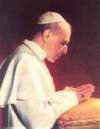
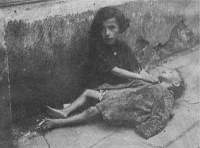
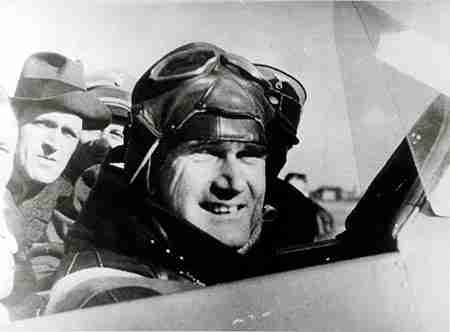
The concern over Italy's and Japan's goodwill led Hitler to issue an announcement that night that Hess's flight to Britain was the result of a mental breakdown, the symptoms of which had been noticed for some time. "My God," wrote Goebbels in his diary that night, "and that was the second man in the Reich. What will the world think of us?" Actually Hitler had to fear something considerably worse than the suspicion of his Axis partners and the mockery of "the world." This was the appalling prospect of Hess—voluntarily or by being drugged or otherwise coerced—giving away to the British the plans for Barbarossa, then scheduled for June 22, with which he was fully familiar. "I don't know how far advanced the British were with truth drugs then," Speer told me, "but voluntarily, Hess would never have betrayed Hitler, of that I am quite certain." In fact, in his letter to Hitler Hess had specifically promised silence, and he kept his promise.
His friend, Albert Haushofer, had told him that I was an Englishman who would appreciate his point of view. He went on to say that he had tried three times to fly to England, the first time in the previous December, but he turned back each time on account of bad weather. The Fuehrer, Hess also maintained, was convinced that Germany would win the war, possibly soon, but certainly in one, two, or three years. Hess himself wished to stop the futile carnage...He asked me if I could get together leading members of my party to talk over things with a view to making peace proposals. I replied that there was now only one party in this country. He then said he could tell me what Hitler's peace terms would be. First, he would insist on an arrangement whereby our two countries would never go to war again. I questioned him as to how that arrangement could be brought about; and he replied that one of the conditions, of course, is that Britain would give up her traditional policy of always opposing the strongest power in Europe.
Schirach's and my conversation, although conducted in a murmur because of the guards, had become quite lively. Kneeling side be side in the hotbed, we thought of more and more anecdotes illustrating Hitler's mania for the theater, which we had once taken as proof of his universal genius, but which now strikes us as peculiar and immature. (Speer II)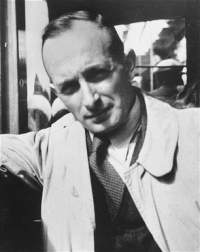

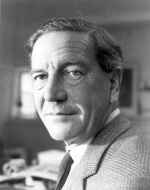
levi.bookin@gmail.com







